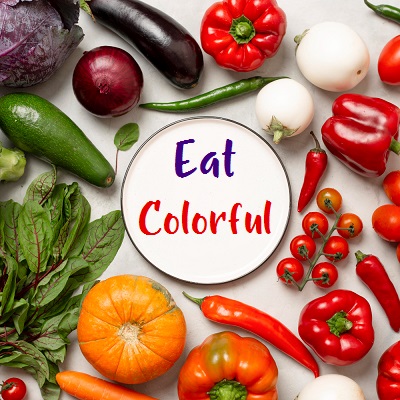 Eating a plant-based diet can enhance your health and there is every reason to believe that it can prolong your life. Many nutrition experts recommend a colorful plate as the more variety in colors of produce the more nutrients you get into your body.
Eating a plant-based diet can enhance your health and there is every reason to believe that it can prolong your life. Many nutrition experts recommend a colorful plate as the more variety in colors of produce the more nutrients you get into your body.
Many color vegetables and fruits can be grown in your garden and will provide fresh, pesticide free produce for you, and your family.
Both fruits and vegetables have their own natural color that will impart many health benefits. They are low in calories and can be picked from your garden when they have a maximum amount of nutrients.
Here are some colorful fruits and vegetables you should be incorporating into your diet every day for maximal health and wellness:
Red Fruits and Vegetables
These include healthy foods such as tomatoes, guava, raspberries, red cabbage, watermelon, cherries, kidney beans, beets, and strawberries. All of these fruits and vegetables are extremely rich in antioxidants such as anthocyanins and lycopene.
Antioxidants stop the chain reaction of oxygen free radicals from the body, which has the potential to damage cells, including cellular DNA. Experts say you will be healthier if you eat up to 30 milligrams of lycopene.
One medium tomato picked fresh from your garden will provide you with 3 milligrams of lycopene. Lycopene is also considered a carotenoid, which helps you make and use Vitamin A in the body.
Orange and Yellow Fruits and Vegetables
These are vegetables and fruits like yellow peppers and cantaloupe. They are rich in beta-carotene, which is a precursor to making vitamin A. Vitamin A is a healthful nutrient that helps your vision at night and is helpful in controlling the health of your skin, bones, and teeth.
Yellow and orange vegetables and fruits also contain folate, which is an antioxidant that also is a preventative against neural tube defects in growing fetuses. You need about 500 mg of vitamin A per day, which can be more than gotten from a couple of cups of yellow cantaloupe. The same amount of cantaloupe provides about 65 mg of folate, of which you need about 320 mg per day.
Green Vegetables
There are many green vegetables you can grow in your garden including greens, peas, and green beans. These are especially good for the health of your bones, teeth, and eyes. You need these vegetables as adequate sources for vitamin K, which helps you clot blood better. Just two cups of raw spinach gives you more than double the amount of vitamin K you require each day for optimal health.
Green vegetables contain great amounts of vitamin C and vitamin E, which aid in decreasing your overall risk for certain chronic disease. They also provide you with the phytonutrients called zeaxanthin and lutein, which are protective against macular degeneration.
Blue and Purple Vegetables
These include blueberries, other berries, and eggplant. They contain anthocyanins, which prevent heart disease through their antioxidant properties. It is known that they contain certain flavonoids and Ellagic acid that can destroy cancer cells, including cells that make lung cancer, pancreatic cancer, stomach cancer and breast cancer. These compounds also have anti-inflammatory properties, which are protective against colon and esophageal cancer.
White Fruits and Vegetables
White fruits and vegetable include pears, apples, cauliflower, cucumbers, and bananas. These foods are fiber-rich which can aid in your digestion and which can bind cholesterol so it doesn’t reach your bloodstream. They also contain antioxidants like quercetin, which is particularly prevalent in pears and apples. White fruits are helpful in lowering your stroke risk.
The Home Garden
Try to incorporate as many colored vegetables as you can in your daily diet. They all act differently on your body and have known health benefits you truly need. This is made easy by growing an organic vegetable and fruit garden at home. It does not take a lot of space, and it is a rewarding and beneficial activity for the whole family.
One of the greatest benefits to growing your own produce is that you can avoid ingesting pesticides that are used in commercial fruits and vegetables. Organic produce is available in stores, but it costs a lot more and that is another great reason to start a garden.






